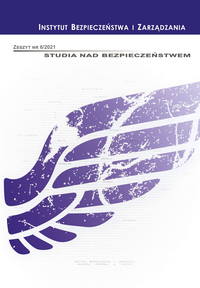Abstract
The article presents the impact of military organizational culture on the individual performance of learners. Its aim is to identify some components of military organizational cul ture that influence individual performance in the training process, which is especially related to motivation for training and military activity. Specific subjects of empirical research are trainees in the Military Science professional field, specialising in Organisation and Management of Military Units at a Tactical Level at the National Military University in Bulgaria.
References
Atanasova-Krasteva N., Leadership Establishment of Cadets, Publishing complex of Vasil Levski National Military University, Veliko Tarnovo 2012.
Atanasova-Krasteva N., Some Theories and Views on Leadership, “Annual University Confe rence National Military University”, Publishing complex of Vasil Levski National Military University, Veliko Tarnovo 2011.
Ćwik B., The Concept of Threat Model in the Aspect of Safety in Logistic Systems, “Systemy Logistyczne Wojsk” 2017, nr 47, Wydawnictwo WAT.
Doncheva J., Principles of training in line with the new thinking and action, SEA – Conf., 3 International Conference, Naval Academy, Constanta 2017, No 3, ISSN 2457-144X. Hofstede G., Culture’s Consequences: International Differences in Work Related Values, Beverly Hills, CA, Sage Publications 1980.
Johnson, G., Rethinking Incrementalism, “Strategic Management Journal” 1988, Vol 9.
Manolov D., Possibilities of the situational approach in the training in security logistics, Con ference proceedings of the Annual University Scientific Conference of the Vasil Levski National Military University, Veliko Tarnovo 2016.
Sotirov D., Stoyanov Y., A Methodology for Evaluation of the Quality of Education in the Specialties at the Vasil Levski National Military University, Scientific Papers from the Scientific Conference at the Vasil Levski National Military University – The Bulgarian Way to NATO – Perspectives and Challenges, 2003, vol. II, Publishing complex of Vasil Levski National Military University, VT, ISSN 0861-0312.
Stefanescu R., Change oriented leadership, “Revew of General Management” 2008, issue no.1, edited by Spiru Haret University, Faculty of Management, Brasov, Romania, ISSN 1841 -818X.
Stefanescu R., Power and its key role in leadership, “Metalurgia International Review” 2010, special issue no 4, Scientifing Editing house F.M.R., Bucharest, Romania, ISSN 1582 2214.
Stoyanova S., Group Management, University Publishing House St. Cyril and Methodius, VT, 2013.
Stoyanova S., Groups – Dynamics and Risks, A & B, VT, 2013.
Stoykov S., Marinov R., A comprehensive approach to education and management in the sy stem of security, International conference Knowledge-based organization-Land Forces Academy, ‘Nicolae Balcescu’, Volume 24: Issue 1, Sibiu-Romania 2018, ISSN 1843 682X.
Stoykov S., Scientific knowledge – source of a competitive advantage in security, International conference on High Technology for Sustainable Development HiTECH 2018, ISBN: 978 1-5386-7039-2.
Świerszcz K., Bezpieczeństwo państwa w czasach współczesnych w ujęciu podmiotowo-aksjo logicznych wyzwań, “Przegląd Nauk o Obronności” 2016, WAT, nr 1–2.
Tsvetkov D., Lectures on Statistical Methods in Psychology, IVIS, Veliko Tarnovo 2015, ISBN 978-619-205-003-0.
Tsvetkov D., Statistical Methods in Psychology, Collection of Reports – May Readings, Pub lisher: Union of Bulgarian Scientists, Veliko Tarnovo 2008.

This work is licensed under a Creative Commons Attribution 4.0 International License.
Copyright (c) 2021 Array

